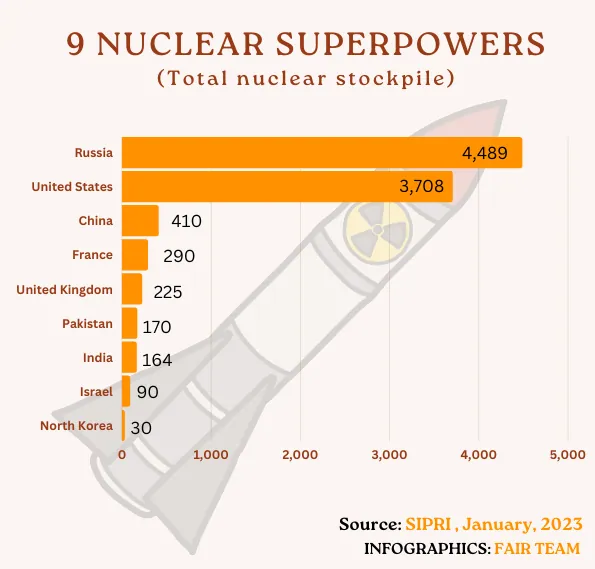The possession of nuclear weapons has long been viewed as a marker of national prowess. Nuclear weapons also grant countries the ability to deter potential adversaries. Presently, nine countries own nuclear capabilities. This article examines these nuclear superpowers and their nuclear programs.
List of the 9 Nuclear Superpowers
Russia, The Reigning Nuclear Superpower
As of January 2023, Russia has approximately 4489 nuclear warheads [SIPRI]
Russia, as the successor state to the Soviet Union, inherited a large nuclear arsenal. It possesses a diverse array of nuclear weapons, including ICBMs, strategic bombers, and submarine-launched ballistic missiles (SLBMs). Russia’s nuclear doctrine places emphasis on deterrence. It has invested in modernizing its nuclear forces in recent years.
United States of America, The First Nuclear Superpower
As of January 2023, the United States has approximately 3708 nuclear warheads [SIPRI]
The United States is the most powerful country in the world. It was the first nation to develop nuclear weapons. The U.S. possesses a diverse range of delivery systems and a robust command and control infrastructure. It maintains the capability to respond to any potential adversary. The U.S. has been involved in nuclear non-proliferation efforts globally
China, The Rising Nuclear Superpower
As of January 2023, China has approximately 410 nuclear warheads [ SIPRI]
China, with its rapidly expanding military capabilities, has emerged as a nuclear superpower. While maintaining a smaller arsenal compared to the U.S. and Russia, China has focused on developing a credible second-strike capability. Its nuclear strategy emphasizes minimum deterrence, with a no-first-use policy, meaning it will not use nuclear weapons unless attacked by nuclear weapons first.
France
As of January 2023, France has approximately 290 nuclear warheads [SIPRI].
France, possessing a modest nuclear arsenal, maintains an independent nuclear deterrent. Its nuclear policy emphasizes the protection of vital national interests and aims to deter potential aggressors. France’s nuclear forces include both submarine-launched ballistic missiles and air-launched nuclear weapons.
United Kingdom
As of January 2023, the United Kingdom has approximately 225 nuclear warheads [SIPRI].
The United Kingdom possesses a limited but potent nuclear arsenal, which serves as a crucial component of its national security strategy. It maintains a continuous at-sea deterrence posture with its ballistic missile submarines. Like France, the UK’s nuclear policy focuses on deterrence and protecting national interests.
Pakistan
As of January 2023, Pakistan has approximately 170 nuclear warheads [SIPRI].
Pakistan, also a non-NPT signatory, possesses a growing nuclear arsenal. Its nuclear doctrine centers on deterring its regional adversary, India. Pakistan maintains a first-use policy. That means it would use nuclear weapons if faced with a conventional attack.
India, The Future Nuclear Superpower
As of January 2023, India has approximately 164 nuclear warheads [ SIPRI]
India developed nuclear weapons and joined the nuclear club in 1998. Its nuclear doctrine emphasizes a credible minimum deterrence posture. India maintains a no-first-use policy. But it reserves the right to respond with nuclear weapons if attacked with biological or chemical weapons. The country is a non-signatory to the Nuclear Non-Proliferation Treaty (NPT),
Israel
As of January 2023, Israel has approximately 90 nuclear warheads [SIPRI].
Israel is widely believed to have a significant nuclear arsenal. It maintains a policy of ambiguity regarding its nuclear capabilities. It neither confirms nor denies their existence. But, its presumed arsenal acts as a deterrent in the volatile Middle East region.
Israel is a non-signatory to the NPT.
North Korea
As of January 2023, North Korea has approximately 30 nuclear warheads [SIPRI].
North Korea’s pursuit of nuclear weapons has garnered significant international attention. Despite international sanctions and condemnation, North Korea has conducted several nuclear tests. It possesses a small but growing nuclear arsenal. Its nuclear program serves as a tool for regime survival and as leverage in its geopolitical ambitions.
Summary of the 9 Nuclear Superpowers
The 9 nuclear superpowers are Russia, the United States, China, France, the United Kingdom, Pakistan, India, Israel and North Korea. The possession of nuclear weapons elevates a country’s status in the global power hierarchy. The nine nuclear superpowers mentioned in this article hold immense geopolitical influence. While efforts toward disarmament and non-proliferation persist, nuclear weapons continue to shape the dynamics of international relations.








